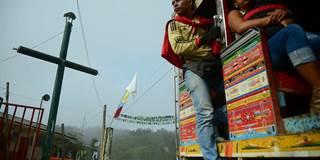Colombian President Juan Manuel Santos was right to push for a peace deal with the FARC guerillas before the end of his second term in 2018. But, having staked his political future on the deal, and now losing popularity as the economy weakens, he should make the upcoming referendum on the agreement about peace, not about himself.
MEXICO CITY – The Colombian government’s peace agreement with the Revolutionary Armed Forces of Colombia (FARC) will be signed on September 26 and decided by the Colombian public in a referendum on October 2.
The accord ends a war that neither side could win, and helps to secure a future for Colombia that would have been impossible with continued conflict. The FARC insurgency was a permanent source of economic uncertainty, and it prevented the government from building badly needed infrastructure – especially for communication technologies – across the country’s vast, difficult terrain. With the FARC obstacle removed, Colombia can now move toward long-term macroeconomic stability, faster growth, and more rapid reductions in poverty and inequality.
Colombian President Juan Manuel Santos was right to push for a deal before the end of his second term in 2018; but his visible eagerness created several disadvantages for his administration – possibly affecting the referendum. For starters, the FARC was able to drag out the negotiations. Doing so enabled it to gain third-party support and restore its leadership, which had suffered major losses in recent years with the deaths of Tirofijo, the nom de guerre of the group’s founder, Manuel Marulanda, and Jorge Briceño Suárez, the iconic military commander known as Mono Jojoy.

MEXICO CITY – The Colombian government’s peace agreement with the Revolutionary Armed Forces of Colombia (FARC) will be signed on September 26 and decided by the Colombian public in a referendum on October 2.
The accord ends a war that neither side could win, and helps to secure a future for Colombia that would have been impossible with continued conflict. The FARC insurgency was a permanent source of economic uncertainty, and it prevented the government from building badly needed infrastructure – especially for communication technologies – across the country’s vast, difficult terrain. With the FARC obstacle removed, Colombia can now move toward long-term macroeconomic stability, faster growth, and more rapid reductions in poverty and inequality.
Colombian President Juan Manuel Santos was right to push for a deal before the end of his second term in 2018; but his visible eagerness created several disadvantages for his administration – possibly affecting the referendum. For starters, the FARC was able to drag out the negotiations. Doing so enabled it to gain third-party support and restore its leadership, which had suffered major losses in recent years with the deaths of Tirofijo, the nom de guerre of the group’s founder, Manuel Marulanda, and Jorge Briceño Suárez, the iconic military commander known as Mono Jojoy.